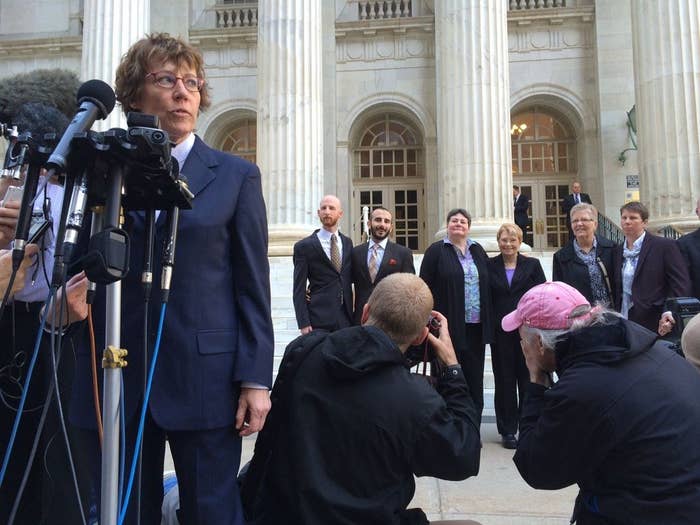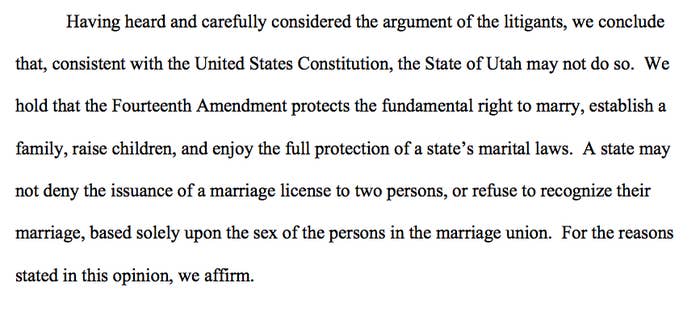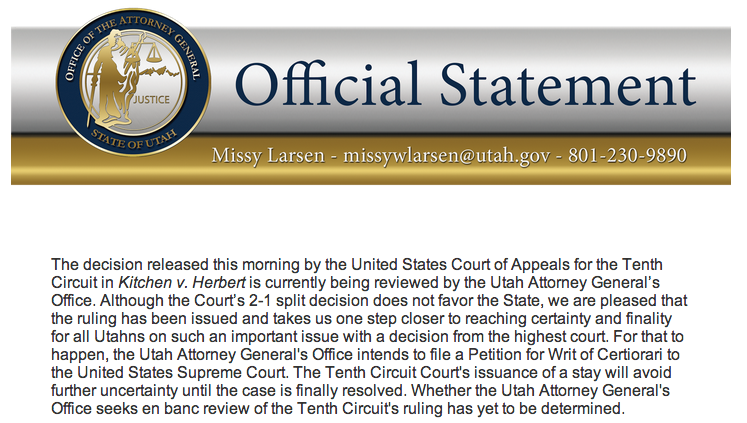
WASHINGTON — A federal appeals court ruled Wednesday that Utah's ban on same-sex couples' marriages is unconstitutional, making it the first federal appellate ruling on the issue since last June's Supreme Court ruling striking down part of the Defense of Marriage Act.
The decision also brings the issue closer to going back to the Supreme Court, as the state could now ask the Supreme Court to hear the case.
The U.S. Court of Appeals for the 10th Circuit, in Wednesday's ruling, upheld the December 2013 federal trial court ruling that the ban is unconstitutional in a 2-1 decision written by Judge Carlos Lucero. The court heard arguments in the case on April 10.
Although more than a dozen federal trial court judges — including, earlier Wednesday, one in Indiana — have ruled in the past year that such marriage bans or marriage recognition bans are unconstitutional, Wednesday's ruling is the first federal appeals court ruling to rule on the question in that time.
Lucero put the ruling on hold pending the outcome of any request for Supreme Court review of the decision, meaning same-sex couples cannot immediately marry in Utah.
The 10th Circuit includes Oklahoma, which has a similar case pending before the judges, as well as Colorado, Kansas, New Mexico, and Wyoming. Only New Mexico has marriage equality currently, but Wednesday's ruling would be precedent in the whole circuit — absent Supreme Court intervention in the case.
Lucero wrote:

In detailing the reasoning, he wrote, "Consistent with our constitutional tradition of recognizing the liberty of those previously excluded, we conclude that plaintiffs possess a fundamental right to marry and to have their marriages recognized."
Importantly, however, at the end of the opinion, the court also stated that because the Supreme Court stayed the trial court's ruling in the Utah case pending the 10th Circuit appeal that it should stay its mandate of the appellate ruling "pending the disposition of any subsequently filed petition for writ of certiorari" to the Supreme Court.
Judge Paul Kelly wrote a 21-page dissent, countering Lucero's 65-page majority opinion. Judge Jermoe Holmes joined the majority opinion.
The 10th Circuit's decision, which cites heavily from Justice Anthony Kennedy's opinion in the DOMA case, United States v. Windsor, was issued one day before the one-year anniversary of the historic Supreme Court decision.
The lawyer for the Utah same-sex couples who brought the lawsuit, Peggy Tomsic, said in a statement, "Today's decision by the Tenth Circuit affirms the fundamental principles of equality and fairness and the common humanity of gay and lesbian people. As the Court recognized, these families are part of Utah's community, and equal protection requires that they be given the same legal protections and respect as other families in this state. The Court's ruling is a victory not only for the courageous couples who brought this case, but for our entire state and every state within the Tenth Circuit."
According to a statement from the Utah Attorney General's office, Attorney General Sean Reyes will be asking the Supreme Court to take the case — although the statement also says that the state could but has not decided whether it will seek en banc rehearing, or review by the full 10th Circuit. [Update at 3:05 p.m.: Spokeswoman Missy Larsen told BuzzFeed the lawyers in the office are still deciding which of the two options to take as its next step, but that the attorney general's aim is to get the highest court possible to review and decide the issue.]

Utah Gov. Gary Hebert issued a statement, saying he was "disappointed" in the decision and that the case should be decided by the Supreme Court.

